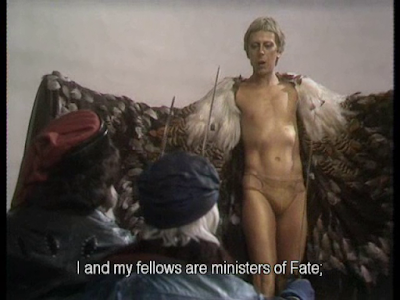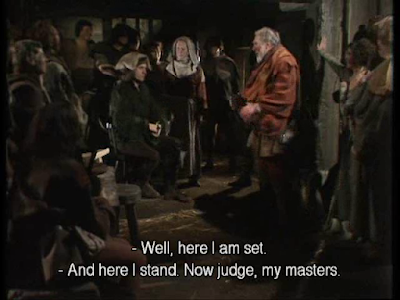Hamlet, Prince of Denmark, first broadcast May 25th, 1980
In both comedies and tragedies, Shakespeare frequently has characters decide to stage overly-elaborate tricks to accomplish their ends, when direct action would have solved things much more easily. In the tragedies, this often leads to unnecessary deaths. In this play, why does Hamlet feign madness? His goal during this section of the play seems to be to find out if his father’s ghost was actually a demon trying to trick him. He seems to think that feigning madness will put him in a position to find out, but his logic is hard to follow.
Of course, one way to play it is that Hamlet has actually been driven mad by seeing his father’s ghost, and only pretends to be pretending it. Jacobi seems far more genuinely mad than Olivier, Gibson or Brannagh and that works well. It’s easy to see him as bipolar, and the business with the ghost triggers a manic episode.
One big difference in the way this was played than what I was used to is Act III, scene i, where Ophelia walks in on the “to be or not to be” soliloquy, and he acts quite insane with her, shouting “Get thee to a nunnery” over and over. Shakespeare reveals at the end of this speech that Polonius and Claudius have been listening in the whole time, but he leaves it ambiguous as to whether or not Hamlet knew that.
I feel like, in most of the versions I’ve seen, Hamlet clearly knows they’re there. At one point, he suddenly asks Ophelia, out of nowhere “Where’s your father?” and she says he’s at home. This often happens after Polonius has made some noise in his hiding place, and Hamlet knows exactly where he is.
But in this production, neither Hamlet nor Ophelia seem to have any idea that anybody is listening in. This is a huge difference, because if Hamlet knows they’re there, then there’s a method in his madness: He has to torment Ophelia to pull off his deception of her father and king. But if he doesn’t know, then he’s just being needlessly sadistic, pushing his masquerade way too far …or he’s genuinely mad.
Jacobi and Bennet have crafted a fairly unsympathetic Hamlet, which is a brave choice. The staging takes away Hamlet’s cunning and presents him as something far worse. Jacobi could not be more volatile, which makes his performance riveting (which is good, because the full-text production is almost four hours long.) I would say this is the strongest of the four filmed Hamlet performances I’ve seen.
- When was it written? Sometime between 1599 and 1601, possibly his 22nd play
- What’s it about? College student Hamlet is called home because his dad died, and also because his mom Gertrude is immediately marrying his dad’s brother, Claudius. When the ghost of his dad tells him that Claudius killed him, Hamlet decides to pretend to be mad while he considers doing something about it. He finally kills Claudius, but not before several more people end up dead, including Gertrude, Hamlet’s girlfriend Ophelia, her dad Polonius, her brother Laertes, and Hamlet’s college chums Rosencrantz and Guildenstern.
- Most famous dialogue: Dozens of oft-quoted lines, but I gotta go with “To be or not to be”
- Sources: Wikipedia lists many sources that have many similar plot elements, then says: “Shakespeare’s main source may be an earlier play—now lost—known today as the Ur-Hamlet. Possibly written by Thomas Kyd or by Shakespeare himself.”
- Interesting fact about the play: Shakespeare’s 11 year old song Hamnet had recently died. They had named him after a neighbor named Hamnet, but that Hamnet was also occasionally called Hamlet, indicating that the names were used interchangeably at the time.
- Best insult: The first of our 12 plays without any good insults! The best I could find was “What devil was’t that thus has conzened you” Even when Hamlet is yelling at his mother he never really resorts to invective.
- Best word: “Marry, this is miching mallecho. It means mischief” Again, context clues fail me.
- Best production of this play I’ve seen: I’ve only seen it once, in a fairly lame production in Atlanta called Hamlet, Godfather of Brooklyn. Of the Olivier, Gibson and Brannagh films, I actually prefer the Gibson, as Olivier is too neurotic and Brannagh too manly.
- Notable Names in the BBC Adaptation: Derek Jacobi returns as Hamlet, Claire Bloom returns as Gertrude, and Patrick Stewart (with an almost full head of hair!) makes his debut as Claudius.
- Jacobi at first seemed not that different from his Richard II, playing the part a little fey, but he gradually won me over. Lalla Ward as a desperate-for-love Ophelia is heartbreaking. Bloom is effective as a much-distressed Gertrude. Stewart’s performance is fascinating. His Claudius is oddly affable and unflappable: When he realizes Hamlet’s play is about him and says “Give me some light!”, he does not yell it. Instead, he’s calmly asking for a torch which he uses to examine Hamlet’s face. He doesn’t even yell “Do not drink!” Ultimately, it’s a fascinating way to play the character. Eric Porter as Polonius almost but not quite has us wanting to see him stabbed, which is just right.
- Apparently Bennet wanted to shoot on location, and when he was denied, he decided to go radically in the other direction, often shooting scenes on just a bare flat soundstage, calling attention to theatricality in a way that no other production has done. I thought that this didn’t work, and just seemed petulant on Bennett’s part (and I spent too much time trying to figure out why some scenes had some stagecraft while others had none at all) He does a fine job with the performances, which is the most important part of a director’s craft, but his avant garde approach to the imagery ultimately does not work.
In both comedies and tragedies, Shakespeare frequently has characters decide to stage overly-elaborate tricks to accomplish their ends, when direct action would have solved things much more easily. In the tragedies, this often leads to unnecessary deaths. In this play, why does Hamlet feign madness? His goal during this section of the play seems to be to find out if his father’s ghost was actually a demon trying to trick him. He seems to think that feigning madness will put him in a position to find out, but his logic is hard to follow.
Of course, one way to play it is that Hamlet has actually been driven mad by seeing his father’s ghost, and only pretends to be pretending it. Jacobi seems far more genuinely mad than Olivier, Gibson or Brannagh and that works well. It’s easy to see him as bipolar, and the business with the ghost triggers a manic episode.
One big difference in the way this was played than what I was used to is Act III, scene i, where Ophelia walks in on the “to be or not to be” soliloquy, and he acts quite insane with her, shouting “Get thee to a nunnery” over and over. Shakespeare reveals at the end of this speech that Polonius and Claudius have been listening in the whole time, but he leaves it ambiguous as to whether or not Hamlet knew that.
I feel like, in most of the versions I’ve seen, Hamlet clearly knows they’re there. At one point, he suddenly asks Ophelia, out of nowhere “Where’s your father?” and she says he’s at home. This often happens after Polonius has made some noise in his hiding place, and Hamlet knows exactly where he is.
But in this production, neither Hamlet nor Ophelia seem to have any idea that anybody is listening in. This is a huge difference, because if Hamlet knows they’re there, then there’s a method in his madness: He has to torment Ophelia to pull off his deception of her father and king. But if he doesn’t know, then he’s just being needlessly sadistic, pushing his masquerade way too far …or he’s genuinely mad.
Jacobi and Bennet have crafted a fairly unsympathetic Hamlet, which is a brave choice. The staging takes away Hamlet’s cunning and presents him as something far worse. Jacobi could not be more volatile, which makes his performance riveting (which is good, because the full-text production is almost four hours long.) I would say this is the strongest of the four filmed Hamlet performances I’ve seen.











